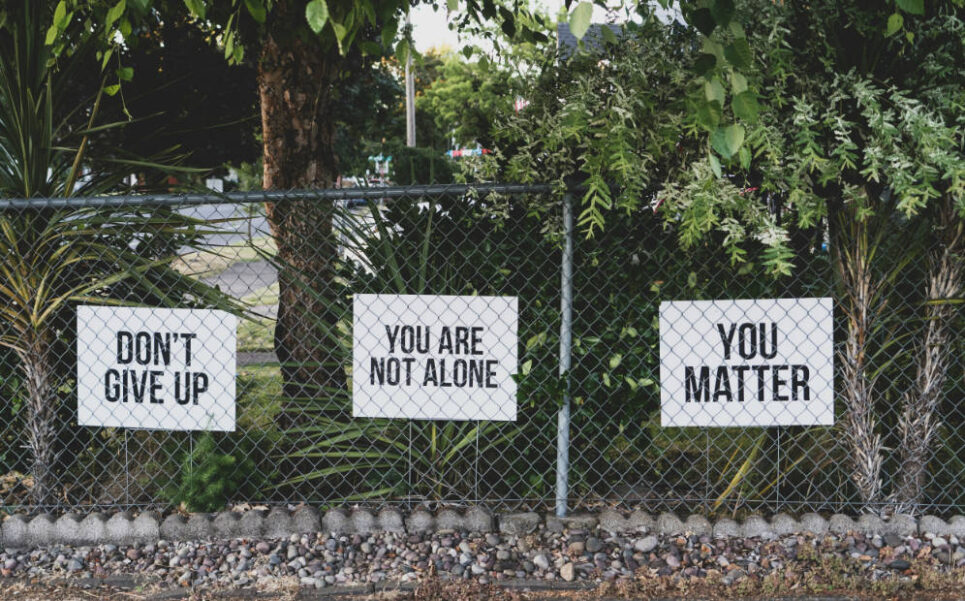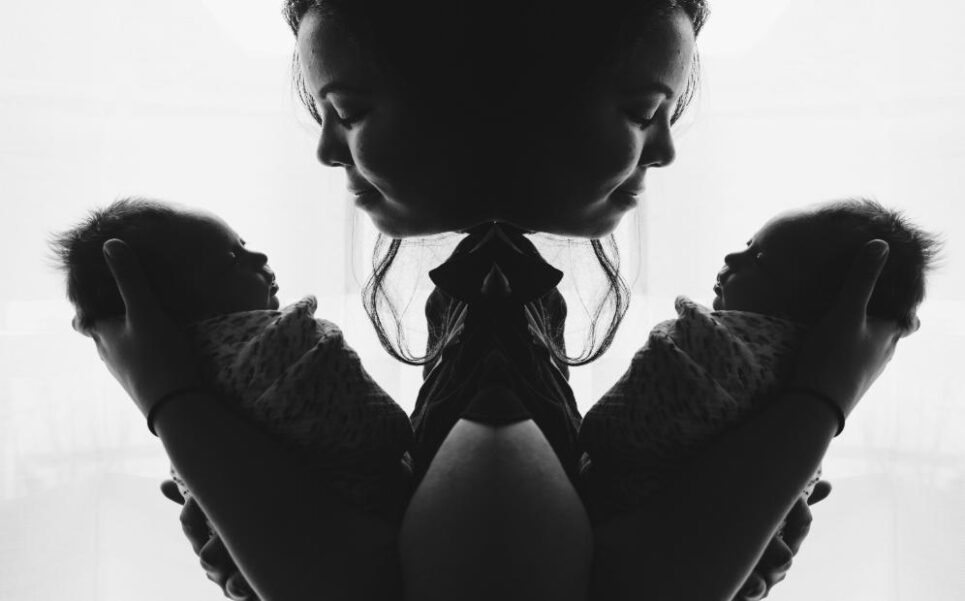It is true when a person becomes a parent their world changes completely, and that is the understatement of the century. But, the changes the female body endures will never be the same as the changes a man can experience when becoming a parent. One of these major changes could be suffering from postpartum depression.
Awareness of postpartum depression first arose in the 80s. Since then, many studies have been conducted on its incidence, risk factors, and successful treatment rates among the world’s population.
What is Postpartum Depression?
Postpartum depression is a form of depression that occurs after childbirth, typically within the first few weeks or months. We must be very clear about the fact that it is different from the “baby blues,” a common and mild mood disorder characterized by mood swings, irritability, and tearfulness, which usually resolve on their own within a few days. Postpartum depression, on the other hand, persists longer and can have a profound impact on a mother’s well-being, her ability to care for her baby, and her relationships.

Some symptoms may include extreme sadness, low energy, anxiety, crying episodes, irritability, and changes in sleeping or eating patterns. It can also negatively affect the newborn child.
While the exact cause of PPD is unclear, the cause is believed to be a combination of physical, emotional, genetic, and social factors. These may include factors such as hormonal changes and sleep deprivation.
It is crucial to understand that while most women experience a brief period of worry or unhappiness after delivery, postpartum depression should be suspected when symptoms are severe and last over two weeks.
“I was in a lot of pain after the birth and I was just really exhausted. I was also having a hard time breastfeeding. Everything was uncomfortable. I felt like such a failure of a mother.”
For many women, postpartum depression is isolating. They are inmerse in sadness, hopelessness and overwhelm that stems not just from the hormonal aspect of pregnancy but from stressors, like a lack of paid leave, insufficient childcare, and the staggering responsibility of caring for a new and helpless human.
The condition, which can arise at any point during the first year postpartum is now recognized as one of the most common complications of childbirth. It affects one in eight new moms, and mental health struggles are a leading cause of pregnancy-related death in the United States, primarily from suicide and drug overdose.

Postpartum depression (PPD) is a significant mental health concern affecting many new mothers around the world. Despite the joyous arrival of a newborn, some women experience overwhelming feelings of sadness, anxiety, and despair after giving birth. In this article, we delve into the complexities of postpartum depression, exploring its causes, symptoms, and available support resources for mothers and their families.
We must state that postpartum psychosis, is a more severe form of postpartum mood disorder. It occurs in about 1 to 2 per 1,000 women following childbirth. Postpartum psychosis is one of the leading causes of the murder of children less than one year of age.
Some symptoms include hallucinations, delusions, disorganized thinking, and mood disturbances.
Postpartum psychosis is considered a medical emergency because of the risk of harm to both the mother and her baby. Women may experience thoughts of harming themselves or their babies, and there is an increased risk of suicide or infanticide if the condition is not treated promptly.
Treatment for postpartum psychosis typically involves hospitalization in a psychiatric facility, where the mother can receive intensive monitoring and care. Medications such as antipsychotic drugs and mood stabilizers may be prescribed to help manage symptoms. In some cases, electroconvulsive therapy (ECT) may be recommended for women who do not respond to medication or who are at high risk of harm to themselves or others.
Causes and symptoms of Postpartum Depression
According to the Office on Womans Health, Depression is a common problem after pregnancy. One in 8 new mothers report experiencing symptoms of postpartum depression in the year after childbirth.
The exact causes are not fully understood, but it is believed to be a combination of biological, psychological, and social factors. Hormonal changes, particularly fluctuations in estrogen and progesterone levels after childbirth, may play a role in triggering depressive symptoms. Additionally, factors such as sleep deprivation, stress, history of depression or anxiety, lack of social support, and difficult life circumstances can contribute to the development of postpartum depression.

Postpartum depression can manifest in various ways, but common symptoms include:
** Persistent feelings of sadness, hopelessness, or emptiness.
** Anxiety, irritability, or agitation, fatigue, insomnia, or excessive sleep.
** Loss of interest or pleasure in activities.
** Difficulty bonding with the baby.
** Changes in appetite or weight.
** Feelings of guilt, worthlessness, or inadequacy
It is essential to recognize that postpartum depression can affect any new mother, regardless of age, socioeconomic status, or cultural background. Seeking help and support is crucial for recovery and well-being.
Several factors may contribute to the development of postpartum depression in women:

After childbirth, hormonal fluctuations may contribute to the onset of postpartum depression in susceptible individuals.
Some women may have a biological predisposition to depression due to genetic factors or alterations in brain chemistry. A personal or family history of depression or anxiety increases the risk of developing postpartum depression.
Women may experience anxiety, self-doubt, and feelings of overwhelm during this transition, which can contribute to the development of postpartum depression.
Lack of social support, strained relationships, financial stress, and difficult life circumstances can exacerbate feelings of isolation, loneliness, and depression in the postpartum period.
Women who lack support networks or face significant stressors may be at higher risk for postpartum depression.

Women who have experienced trauma, abuse, or adverse life events, such as a history of childhood abuse or intimate partner violence, may be more vulnerable to developing postpartum depression.
Pregnancy and childbirth can trigger unresolved emotional issues and exacerbate existing mental health challenges.
Complications during pregnancy or childbirth, traumatic birth experiences, and unexpected outcomes, such as medical interventions or emergency procedures, can contribute to feelings of distress, disappointment, and trauma, increasing the risk of postpartum depression.
In some cases, postpartum depression may be linked to hormonal imbalances or underlying medical conditions, such as thyroid disorders, which can affect mood and energy levels. Proper diagnosis and treatment of these underlying conditions are essential for managing postpartum depression effectively.
It is important to recognize that postpartum depression is not caused by a single factor but rather results from a combination of biological, psychological, social, and environmental factors.
By understanding these contributing factors, healthcare providers can provide comprehensive support and treatment tailored to the individual needs of women experiencing postpartum depression. Early intervention, appropriate treatment, and social support are key to promoting recovery and well-being in mothers affected by postpartum depression.
Treatment and Support
The good news is that postpartum depression is treatable, and there are various options available to support mothers in their healing journey. But, it is not always a one-step solution. Treatment may include a combination of therapy, medication, support groups, and self-care strategies tailored to the individual’s needs.
Therapy, such as cognitive-behavioral therapy (CBT) or interpersonal therapy (IPT), can help mothers explore their feelings, develop coping skills, and improve communication with their loved ones. Medications, such as antidepressants, may be prescribed in cases of moderate to severe depression, under the guidance of a healthcare provider.

In addition to professional treatment, social support plays a vital role in recovery from postpartum depression. Friends, family members, and support groups can offer emotional support, practical assistance with childcare and household tasks, and validation of the mother’s experiences.
Self-care practices are also essential for managing postpartum depression. Mothers should prioritize sleep, nutrition, exercise, and activities that bring them joy and relaxation. Setting realistic expectations, asking for help when needed, and practicing self-compassion are key components of self-care.
For mothers experiencing postpartum depression, there are numerous resources available for support and guidance:
How does it affect women worldwide?
Postpartum depression affects women worldwide, but its prevalence and impact vary across different countries and regions. Postpartum depression is a global issue as well. The condition affects tens if not hundreds of millions annually if all countries are accounted for.
The United States has a relatively high prevalence of postpartum depression compared to many other developed countries. Various factors contribute to this, including societal pressure on women to balance work and family responsibilities, limited access to affordable healthcare and mental health services, and cultural norms around motherhood and self-sufficiency.
With approximately 4 million live births occurring annually in the United States, there are almost 600,000 postpartum depression diagnoses (live births). Many women who miscarry or have stillbirths experience postpartum depression symptoms as well.

Data released in 2019 indicates that 23% of new mothers in Canada experienced symptoms of postpartum depression or anxiety after childbirth. Mothers who are 25 years old or younger were more likely to develop postpartum depression or anxiety.
Similar to the U.S., the number of new mothers in the UK who experience postpartum depression, also called perinatal depression, is around 1 in 10. Approximately 1 in 8 British women also experience depression during pregnancy (antenatal depression).
Postpartum depression is a common mental health issue in Colombia. According to data from the Ministry of Health and Social Protection of Colombia, it is estimated that around 20% of women who give birth in the country experience symptoms of postpartum depression. These figures are concerning, as they indicate that approximately one in five women face this condition after giving birth.
It is important to note that in many developing countries, women’s mental health needs are often overlooked, and resources for maternal mental health are limited. High fertility rates, early marriage, limited education, and gender inequality contribute to women’s vulnerability to postpartum depression in these settings.
“Every time I had to breastfeed I started to cry. I dreaded feeding him every two hours. I wondered whether my son was better off without me.”
Furthermore, exposure to environmental stressors such as poverty, food insecurity, infectious diseases, and political instability can exacerbate mental health issues for new mothers.
Lack of awareness, stigma, and cultural barriers to seeking help further compound the challenges faced by women with postpartum depression in developing countries.
Women living in conflict-affected or humanitarian settings are particularly vulnerable to mental health disorders, including postpartum depression. Displacement, violence, loss of loved ones, and lack of access to healthcare services can contribute to high rates of maternal mental health problems in these contexts.
Postpartum depression is a global public health issue that affects women across countries and cultures, albeit to varying degrees. Understanding the cultural, social, and economic factors that contribute to disparities in women’s mental health after childbirth is essential for developing effective interventions and policies to support maternal mental health worldwide.
By addressing systemic barriers, promoting awareness, and prioritizing women’s mental health within healthcare systems, communities, and policy agendas, we can work towards ensuring that all women receive the support and care they need to thrive during the postpartum period.
About the cultural misconceptions
Postpartum depression is a serious mental health condition that affects millions of women worldwide. So, postpartum depression is often shrouded in stigma and misconceptions, particularly within different cultural contexts.
One of the most pervasive misconceptions about postpartum depression is the belief that experiencing depression after childbirth is a sign of weakness or failure as a mother. In many cultures, there is pressure on women to fulfill idealized expectations of motherhood, which can lead to feelings of shame, guilt, and inadequacy for those struggling with postpartum depression. It is crucial to recognize that postpartum depression is a medical condition that can affect anyone, regardless of strength, character, or maternal instinct.
Another common misconception is the conflation of postpartum depression with the milder and more transient “baby blues.” While it is normal for new mothers to experience mood swings, irritability, and tearfulness in the days following childbirth, postpartum depression is a distinct and more severe condition that persists beyond the postpartum period. Failure to differentiate between baby blues and postpartum depression can lead to underrecognition and undertreatment of this serious mental health condition.

Postpartum depression can occur in women from all cultural backgrounds, socioeconomic statuses, and ethnicities. However, cultural beliefs and practices surrounding childbirth, motherhood, and mental health may influence how postpartum depression is perceived and addressed within different communities. Stigma, lack of awareness, and cultural norms around seeking help for mental health concerns can contribute to underreporting and undertreatment of postpartum depression in some cultural groups.

Contrary to popular belief, postpartum depression is not rare but rather a common and treatable condition affecting approximately 10-15% of women after childbirth. However, due to stigma, lack of awareness, and cultural factors, many cases of postpartum depression go unrecognized and untreated.
It is essential to challenge the misconception that postpartum depression is uncommon and emphasize the importance of early detection and intervention for optimal maternal and infant outcomes.
Shockingly, while postpartum depression primarily affects mothers, it can also have significant implications for the entire family, including partners, children, and extended relatives.
Paternal postpartum depression affects 8 to 10% of fathers. The cause may be distinct in males. Causes of paternal postpartum depression include hormonal changes during pregnancy, which can be indicative of father-child relationships.
Postpartum depression in men leads to an increased risk of suicide, while also limiting healthy infant-father attachment. Men who experience PPD can exhibit poor parenting behaviors, and distress, and reduce infant interaction. Reduced paternal interaction can later lead to cognitive and behavioral problems in children.
Cultural misconceptions about postpartum depression can contribute to stigma, shame, and barriers to seeking help for affected mothers. By challenging these misconceptions, promoting awareness, and fostering culturally sensitive approaches to mental health care, we can create a supportive environment where mothers feel empowered to seek help, access appropriate treatment, and receive the support they need to recover and thrive after childbirth.
Conclusion
It is essential that we all recognize postpartum depression as a common and treatable condition that deserves compassion, understanding, and effective support from families, communities, and healthcare providers alike.
Postpartum depression is a significant challenge for the mental health. With alarming figures and symptoms that can have a profound impact on daily life, it is essential to provide adequate support and resources.

Postpartum depression should not be ignored or stigmatized. It is a legitimate medical condition that requires attention and support.
By recognizing the symptoms and seeking early help, affected women can receive appropriate treatment and recover, enabling them to care for themselves and their babies optimally.
Through increased awareness, timely medical care, and a compassionate support system, we can help women overcome postpartum depression and live healthy, happy lives alongside their children.
In summary, being a parent is not easy, it doesnt come with a handbook. Being a mother is not easy and the emotions and rollercoaster ride it entails for our body, mind and soul should be a concern for everyone.


